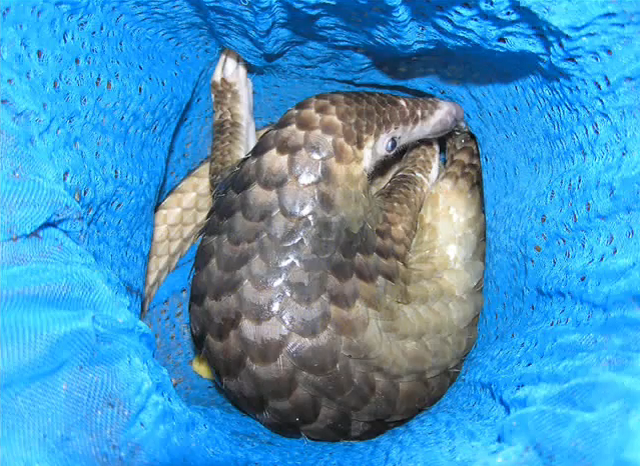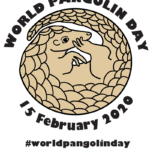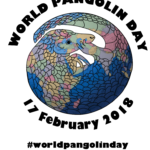After two wild, high speed chases, authorities have seized a total of 1,174 pangolins – most of them dead – in Vietnam and Sabah, Malaysia since Wednesday.

A wild goose chase on the high seas off Sabah, Malaysia and a high speed car chase in Vietnam over the past week have yielded over 1,000 pangolins destined to be consumed as a delicacy or crushed into ‘medicine’.
According to news reports, the value of the pangolins seized in the two busts amounts to over US $1.3 million.
Pangolin pirates jump ship to evade law enforcement
When Sabah’s newly formed special marine team attempted to stop a large ship on Wednesday, the vessel headed toward open sea with the officials following close behind.
According to the New Sabah Times, the boat turned back toward shore at one point and, after running aground near the shoreline, suspects began jumping into the water to escape arrest.
On board, the team found 178 containers purportedly holding the meat of some 1,068 frozen pangolins said to be worth over US $1.26 million – Sabah’s largest seizure of pangolin meat in history.
Authorities believe the illicit haul was on its way to the Philippines, a major transit route for illegal wildlife trade.
Sadly, the team was able to apprehend only one suspect from the ship – an 18 year old Filipino boy, highlighting the importance of educating youth that live throughout the pangolins’ range.
Deputy State Customs Director, Hamzah Sundang, reports that the investigation is ongoing and that Customs officials will continue to beef up operations against smuggling activities.
Minister of Tourism, Culture, and Environment, Datuk Masidi Manjun, expressed his shock surrounding the bust.
“This is shocking,” Tourism, Culture and Environment Minister Datuk Masidi Manjun said when contacted by News Sabah Times yesterday.
“There is something wrong with enforcement. You cannot possible attempt to smuggle out so much Pangolin meat,” he said.
High speed chase in Vietnam sheds light on one way pangolin smugglers try to escape detection
Police in Vietnam’s Ha Tinh Province nabbed two suspects found with 106 live pangolins in their vehicle, which featured counterfeit registration plates, says Dantri International News.
The haul is said to be worth around US $47,600 and among the defenseless creatures, the authorities also apparently found sticks, tubes, and dozens of other bogus number plates from various localities and agencies.
The suspects, Nguyen Van Ngon and Do Manh Viet, rammed several police cars in their attempt to flee at high speeds with the delicate pangolins being jarred around inside the entire time.
It is not known if all of the animals survived the incident, but those that did are now under the care of the provincial Forestry Board.
Investigations are said to be ongoing and, whilst the origin and destination of the illegal haul are unknown, Vietnam is known to be one of the world’s largest sources of demand for pangolins.
Surging demand for pangolins
These animals are in high demand in East and Southeast Asia, with China and Vietnam identified as the largest consumer nations.
There, the flesh of adults and fetuses are consumed as delicacies and their scales are used to make traditional medicines.
According to wildlife trade monitoring network, TRAFFIC, pangolins are the most commonly encountered mammals in the illegal wildlife trade in Asia.
Click here to see eight things everyone should know about black market trade in pangolins.
Superstitious beliefs stimulate trade
Like other animal-based traditional Chinese medicines, pangolins’ body parts and scales are superstitiously used as somewhat of a “cure-all” remedy for things like reducing swelling, improving liver function, weight loss, stimulating blood circulation, and enhancing lactation in breast-feeding women.
There is no scientific evidence to support any of the medicinal claims made about pangolin body parts.
Rhino horn and pangolin scales, much like our own hair and nails, are chiefly composed of keratin.
Studies have repeatedly shown rhino horn to be void of any curative properties.
Watch this video from wildlife trade monitoring network, TRAFFIC, to learn more about the illegal pangolin trade:
Author: Sarah Pappin. Read more about Sarah here.
Image via YouTube (see video)
Want to help? Check out our pangolin t-shirts: Project Pangolin is contributing $2.00 per t-shirt or hoodie to Education for Nature-Vietnam.






1 Comment
Comments are closed.